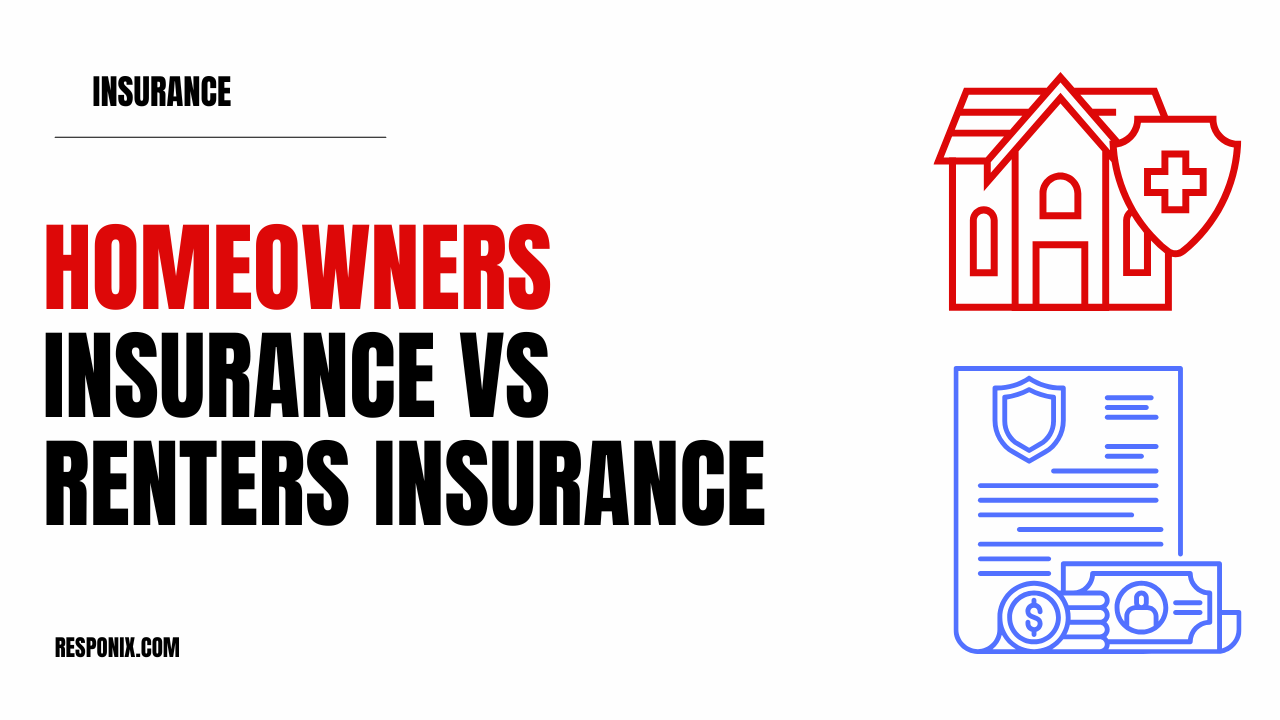Table of Contents
Introduction: Understanding the Insurance Maze
Have you ever wondered what is the primary difference between homeowners insurance and renters insurance? You’re not alone. Many people especially first-time renters or buyers find the insurance world confusing. Homeowners insurance and renters insurance might seem similar because they both offer protection for your personal belongings. But in reality, they serve very different purposes.
In this comprehensive guide, we’ll break down the exact differences, coverages, exclusions, and help you make a confident choice whether you’re buying a home or just renting one. Let’s decode the details in plain English.
Homeowners Insurance vs Renters Insurance: The Core Difference
Homeowners insurance is designed for people who own their home. It not only protects personal belongings but also covers the structure of the home itself.
Renters insurance, on the other hand, is made for people who rent. It protects only personal property and liability not the structure, which is the landlord’s responsibility.
What Homeowners Insurance Covers
Dwelling Coverage:
This covers the structure of the house, including walls, roof, floors, and built-in appliances in the event of disasters like fire or hail.
Other Structures:
Detached garages, fences, sheds these are covered under most standard homeowners policies.
Personal Property:
Furniture, electronics, clothes if they’re damaged or stolen, you’re covered.
Liability Protection:
Covers you if someone is injured on your property or if you accidentally damage someone else’s.
Loss of Use (ALE – Additional Living Expenses):
If a covered peril like fire forces you to leave your home temporarily, insurance pays for hotel, food, and travel.
What Renters Insurance Covers
Personal Property Only:
Renters insurance covers your belongings from fire, theft, vandalism, and even water damage from leaky pipes but not the structure itself.
Liability Protection:
If your pet bites someone, or if you accidentally start a kitchen fire that damages another unit, liability covers you.
Loss of Use:
Just like homeowners insurance, renters insurance includes Additional Living Expenses if your rental becomes uninhabitable.
Structural Coverage: Who’s Responsible for What?
This is the primary difference that impacts cost, responsibility, and risk.
- In homeowners insurance, you are responsible for the house structure. The insurance covers roof, walls, flooring everything.
- In renters insurance, the landlord is responsible for the structure. You only need to worry about your belongings and liability.
Cost Comparison: Homeowners vs Renters Insurance
Homeowners Insurance:
- Average annual cost in the U.S.: ~$1,428 (according to Policygenius)
- Influenced by location, home value, construction type, and claims history.
Renters Insurance:
- Average annual cost in the U.S.: ~$180
- Much more affordable since it doesn’t cover the building.
Who Needs What?
- If you own your home, you legally and financially need homeowners insurance.
- If you rent, your landlord may require you to carry renters insurance but even if not, it’s a smart move for peace of mind.
Liability Differences Explained
Homeowners Liability:
More extensive, since you’re responsible for the property and guests on it. It can include pool accidents, dog bites, and structural mishaps.
Renters Liability:
Focused more on actions you take as a tenant (e.g., water overflow damaging a downstairs apartment, or accidental injuries to guests).
Loss of Use Benefits Compared
Both insurance types include Additional Living Expenses, but the coverage limits may differ.
- Homeowners Insurance: Tends to offer higher ALE limits due to longer repair times.
- Renters Insurance: ALE is usually limited but adequate for short-term displacements.
Add-Ons & Customizations
Homeowners Insurance Riders May Include:
- Flood or earthquake coverage
- Home business protection
- High-value item protection (jewelry, art, electronics)
Renters Insurance Add-Ons:
- Identity theft coverage
- Pet damage protection
- Replacement cost coverage for electronics or valuables
What’s NOT Covered by Either
- Floods and earthquakes: Separate policies are required.
- Wear and tear
- Neglect or intentional damage
Claim Filing Process: Renters vs Homeowners
Homeowners:
May involve contractors, adjusters, repair estimates more complex due to property repairs.
Renters:
Usually simpler and quicker, focusing on personal property reimbursement or liability resolution.
How Deductibles Work in Each Policy
- Homeowners Insurance: Higher deductibles, since the claim amounts are usually large.
- Renters Insurance: Lower deductibles, usually $250–$500.
Real-Life Scenario Comparison
Scenario 1: House Fire
- Homeowners: Structure and contents are covered.
- Renters: Only contents are covered. Landlord handles structure.
Scenario 2: Theft
- Both policies cover stolen personal property whether stolen at home or while traveling.
Insurance Provider Recommendations (Trusted Sources)
Here are some providers recognized for reliable policies:
- State Farm – statefarm.com
- Allstate – allstate.com
- Lemonade – lemonade.com (great for renters insurance)
- Liberty Mutual – libertymutual.com
Each of these companies offer both homeowners and renters policies with customization options.
Final Thoughts: Which One Should You Choose?
The primary difference between homeowners insurance and renters insurance lies in who owns the property and the scope of coverage.
If you own your home, you need full coverage, including the structure.
If you rent, you only need to protect your stuff and have liability coverage.
Either way, not having insurance is a risk you can’t afford.
FAQs
1. Does renters insurance cover damage to my apartment’s structure?
No. That’s the landlord’s responsibility. Renters insurance only covers your belongings and liability.
2. Is renters insurance mandatory?
It’s not required by law, but many landlords require it as part of the lease.
3. Can homeowners insurance cover rental property?
Only if you get a special landlord or rental dwelling policy not a regular homeowners policy.
4. What if I work from home do I need extra coverage?
Yes. Homeowners may need a home business endorsement. Renters may need added electronics or liability coverage.
5. Can I get both renters and homeowners insurance?
Not at the same time. You only need one depending on whether you own or rent your home.


